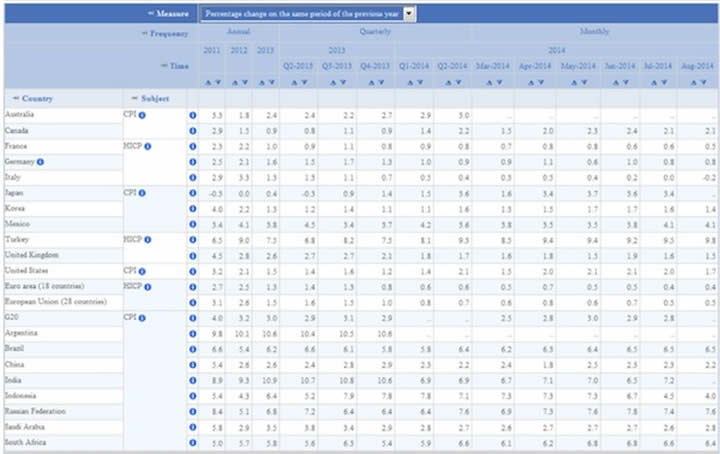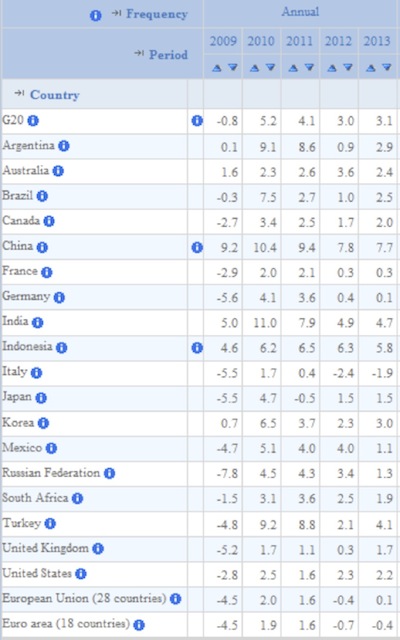The End of Monetary Policy
Politics / Global Financial System Sep 29, 2014 - 05:45 PM GMTBy: John_Mauldin
 We are the hollow men
We are the hollow men
We are the stuffed men
Leaning together
Headpiece filled with straw. Alas!
Our dried voices, when
We whisper together
Are quiet and meaningless
As wind in dry grass
Or rats’ feet over broken glass
In our dry cellar…
This is the way the world ends
This is the way the world ends
This is the way the world ends
Not with a bang but a whimper.
– T. S. Eliot, “The Hollow Men”
What we may be witnessing is not just the end of the Cold War, or the passing of a particular period of postwar history, but the end of history as such: that is, the end point of mankind’s ideological evolution and the universalization of Western liberal democracy as the final form of human government. This is not to say that there will no longer be events to fill the pages of Foreign Affairs' yearly summaries of international relations, for the victory of liberalism has occurred primarily in the realm of ideas or consciousness and is as yet incomplete in the real or material world. But there are powerful reasons for believing that it is the ideal that will govern the material world in the long run.
– Francis Fukuyama, The End of History and the Last Man
Francis Fukuyama created all sorts of controversy when he declared “the end of history” in 1989 (and again in 1992 in the book cited above). That book won general applause, and unlike many other academics he has gone on to produce similarly thoughtful work. A review of his latest book, Political Order and Political Decay: From the Industrial Revolution to the Globalisation of Democracy, appeared just yesterday in The Economist. It’s the second volume in a two-volume tour de force on “political order.”
I was struck by the closing paragraphs of the review:
Mr. Fukuyama argues that the political institutions that allowed the United States to become a successful modern democracy are beginning to decay. The division of powers has always created a potential for gridlock. But two big changes have turned potential into reality: political parties are polarised along ideological lines and powerful interest groups exercise a veto over policies they dislike. America has degenerated into a “vetocracy”. It is almost incapable of addressing many of its serious problems, from illegal immigration to stagnating living standards; it may even be degenerating into what Mr. Fukuyama calls a “neopatrimonial” society in which dynasties control blocks of votes and political insiders trade power for favours.
Mr. Fukuyama’s central message in this long book is as depressing as the central message in “The End of History” was inspiring. Slowly at first but then with gathering momentum political decay can take away the great advantages that political order has delivered: a stable, prosperous and harmonious society.
While I am somewhat more hopeful than Professor Fukuyama is about the future of our political process (I see the rise of a refreshing new kind of libertarianism, especially among our youth, in both conservative and liberal circles, as a potential game changer), I am concerned about what I think will be the increasing impotence of monetary policy in a world where the political class has not wisely used the time that monetary policy has bought them to correct the problems of debt and market-restricting policies. They have avoided making the difficult political decisions that would set the stage for the next few decades of powerful growth.
So while the title of this letter, “The End of Monetary Policy,” is purposely provocative, the longer and more appropriate title would be “The End of Effective and Productive Monetary Policy.” My concern is not that we will move into an era of no monetary policy, but that monetary policy will become increasingly ineffective, so that we will have to solve our social and physical problems in a much less friendly economic environment.
In today’s Thoughts from the Frontline, let’s explore the limits of monetary policy and think about the evolution and then the endgame of economic history. Not the end of monetary policy per se, but its emasculation.
Asset classes all over the developed world have responded positively to lower interest rates and successive rounds of quantitative easing from the major central banks. To the current generation it all seems so easy. All we have to do is ensure permanently low rates and a continual supply of new money, and everything works like a charm. Stock and real estate prices go up; new private equity and credit deals abound; and corporations get loans at low rates with ridiculously easy terms. Subprime borrowers have access to credit for a cornucopia of products.
What was Paul Volcker really thinking by raising interest rates and punishing the economy with two successive recessions? Why didn’t he just print money and drop rates even further? Oh wait, he was dealing with the highest inflation our country had seen in the last century, and the problem is that his predecessor had been printing money, keeping rates too low, and allowing inflation to run out of control. Kind of like what we have now, except we’re missing the inflation.
The Organization for Economic Cooperation and Development has a marvelous website full of all sorts of useful information. Let’s start by looking at inflation around the world. This table is rather dense and is offered only to give you a taste of what’s available.

What we find out is that inflation is strikingly, almost shockingly, low. It certainly seems so to those of us who came of age in the ’60s and ’70s and who now, in the fullness of time, are watching aghast as stupendous amounts of various currencies are fabricated out of thin air. Seriously, if I had suggested to you back in 2007 that central bank balance sheets would expand by $7-8 trillion in the next half-decade but that inflation would be averaging less than 2%, you would have laughed in my face.
Let’s take a quick world tour. France has inflation of 0.5%; Italy’s is -0.2% (as in deflation); the euro area on the whole has 0.4% inflation; the United Kingdom (which still includes Scotland) is at an amazingly low 1.5% for the latest month, down from 4.5% in 2011; China with its huge debt bubble has 2.2% inflation; Mexico, which has been synonymous with high inflation for decades, is only running in the 4% range. And so on. Looking at the list of the major economies of the world, including the BRICS and other large emerging markets, there is not one country with double-digit inflation (with the exception of Argentina, and Argentina is always an exception – their data lies, too, because inflation is 3-4 times what they publish.) Even India, at least since Rajan assumed control of the Reserve Bank of India, has watched its inflation rate steadily drop.
Japan is the anomaly. The imposition of Abenomics has seemingly engineered an inflation rate of 3.4%, finally overcoming deflation. Or has it? What you find is that inflation magically appeared in March of this year when a 3% hike in the consumption tax was introduced. When government decrees that prices will go up 3%, then voilà, like magic, you get 3% inflation. Take out the 3% tax, and inflation is running about 1% in the midst of one of the most massive monetary expansions ever seen. And there is reason to suspect that a considerable part of that 1% is actually due to the ongoing currency devaluation. The yen closed just shy of 110 yesterday, up from less than 80 two years ago.
I should also point out that, one year from now, this 3% inflation may disappear into yesteryear’s statistics. The new tax will already be factored into all current and future prices, and inflation will go back to its normal low levels in Japan.
Inflation in the US is running less than 2% (latest month is 1.7%) as the Fed pulls the plug on QE. As I’ve been writing for … my gods, has it really been two decades?! – the overall trend is deflationary for a host of reasons. That trend will change someday, but it will be with us for a while.
Gross domestic product around the developed world ranges anywhere from subdued to anemic to outright recessionary:

The G-20 itself is growing at an almost respectable 3%, but when you look at the developed world’s portion of that statistic, the picture gets much worse. The European Union grew at 0.1% last year and is barely on target to beat that this year. The euro area is flat to down. The United Kingdom and the United States are at 1.7% and 2.2% respectively. Japan is in recession. France is literally at 0% for the year and is likely to enter recession by the end of the year. Italy remains mired in recession. Powerhouse Germany was in recession during the second quarter.
Let’s put those stats in context. We have seen the most massive monetary stimulation of the last 200 years in the developed world, and growth can be best described as faltering. Without the totally serendipitous shale oil revolution in the United States, growth here would be about 1%, or not much ahead of where Europe is today.
Demographics, Debt, Bond Bubbles, and Currency Wars
Look at the rest of the economic ecology. Demographics are decidedly deflationary. Every country in the developed world is getting older, and with each year there are fewer people in the working cohort to support those in retirement. Government debt is massive and rising in almost every country. In Japan and many countries of Europe it is approaching true bubble status. Anybody who thinks the current corporate junk bond market is sustainable is smoking funny-smelling cigarettes. (The song from my youth “Don’t Bogart That Joint” pops to mind. But I digrass.)
We are seeing the beginnings of an outright global currency war that I expect to ensue in earnest in 2015. My co-author Jonathan Tepper and I outlined in both Endgame and Code Red what we still believe to be the future. The Japanese are clearly in the process of weakening their currency. This is just the beginning. The yen is going to be weakening 10 to 15% a year for a very long time. I truly expect to see the yen at 200 to the dollar somewhere near the end of the decade.
ECB head Mario Draghi is committed to weakening the euro. The reigning economic philosophy has it that weakening your currency will boost exports and thus growth. And Europe desperately needs growth. Absent QE4 from the Fed, the euro is going to continue to weaken against the dollar. Emerging-market countries will be alarmed at the increasing strength of the dollar and other developed world currencies against their currencies and will try to fight back by weakening their own money. This is what Greg Weldon described back in 2001 as the Competitive Devaluation Raceway, which back then described the competition among emerging markets to maintain the devaluation of their currencies against the dollar.
Today, with Europe and Japan gunning their engines, which have considerable horsepower left, it is a very competitive race indeed – and one with far-reaching political implications for each country. As I have written in past letters, it is now every central banker for him- or herself.
To continue reading this article from Thoughts from the Frontline – a free weekly publication by John Mauldin, renowned financial expert, best-selling author, and Chairman of Mauldin Economics – please click here.
John Mauldin Archive |
© 2005-2022 http://www.MarketOracle.co.uk - The Market Oracle is a FREE Daily Financial Markets Analysis & Forecasting online publication.



